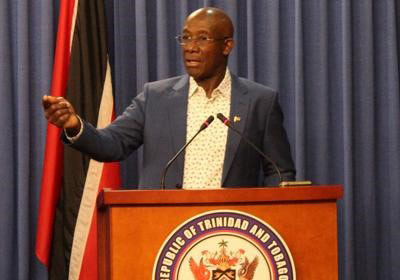(Trinidad Express) Prime Minister Dr Keith Rowley announced yesterday a further ease up of the regulations related to the Covid-19 pandemic.
The start of Phase 2 has been moved up from May 24. It will now end on Wednesday. Phase 2 now begins on Thursday.
Phase 2 will allow for the reopening of the entire manufacturing sector.
The construction sector will also be reopened across the board.
Motor mechanics, tyre shops, and spare parts businesses will be opened up along with laundry and dry cleaning services.
The quarrying business would be allowed to open.
Vehicle dealerships will remain closed.
“In the very near future” he said, bars would reopen.
As a result, more people are expected to be on the move in public and private transport.
As a result, more maxi taxi and public transport will have to continue its spacing and social distancing policy, and carry a 50 per cent load.
The police will be asked that this be enforced, and there would be patrols involving police officers and the district medical officer.
A fuel support grant of $2,000 will be made available to taxi and maxi operators to be able to conduct business and transport people.
This would cost the State some $6 million, part of the estimated $6 billion that was expected to be spent on the Covid response in Trinidad and Tobago.
He advised that other members of the public, who have no reason to leave their homes to stay at home.
“If you don’t have to go to work or just want to leave home to go somewhere please don’t,” he said.
If there is a good result during Phase 2, then phase 3 will be moved up.
He said the authorities would have loved to have allowed barbers, hair dressers to reopen and for domestic servants to return to work, this area posed the greatest threat.
He said social services would be directed to be allowed priority for access to state financial support.
The borders remain closed, said the Prime Minister, because it remained the greatest risk of local spread.
He said that the Trinidadians students at campuses in the Caribbean would be allowed home, but they wanted to complete their examinations.
“We have abandoned no one” he said.


